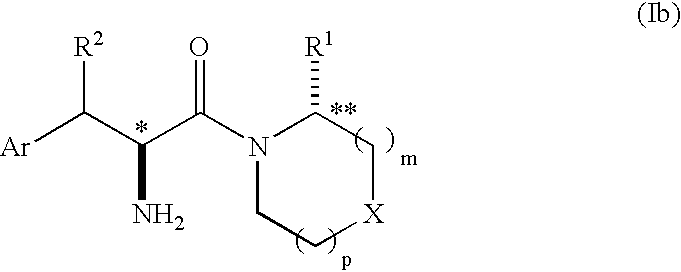Phenylalanine derivatives as dipeptidyl peptidase inhibitors for the treatment or prevention of diabetes
a technology of dipeptide inhibitors and phenylalanine derivatives, which is applied in the direction of biocide, drug composition, metabolic disorder, etc., can solve the problems of increased and premature morbidity and mortality, increased risk of macrovascular and microvascular complications in patients with type 2 diabetes mellitus, and increased risk of macrovascular and microvascular complications in patients
- Summary
- Abstract
- Description
- Claims
- Application Information
AI Technical Summary
Benefits of technology
Problems solved by technology
Method used
Image
Examples
example 1
[0278]
3-[(2S,3S)-2-Amino-3-(4-fluorophenyl)-1-oxobutanyl]thiazolidine, trifluoroacetic acid salt
Step A: (4S)-3-[(2E)-But-2-enoyl]-4-phenyl-1,3-oxazolidin-2-one
[0279]To a stirred solution of 4(S)-4-phenyl-2-oxazolidinone (97.0 g, 43.0 mmol) in tetrahydrofuran (THF, 100 mL) was added n-butyllithium (30.0 mL, 1.6M in hexanes, 48.0 mmol) at −78° C. The mixture was stirred for 20 min and then crotonyl chloride (5.0 g, 43.0 mmol) was added. The resultant solution was stirred for 30 min at −78° C. and 1.5 h at room temperature. The reaction was quenched by the addition of saturated aqueous ammonium chloride solution. The resultant aqueous slurry was diluted with water and extracted with three portions of ethyl acetate. The combined organic layers were washed with saturated aqueous sodium bicarbonate solution and brine, dried over sodium sulfate, and concentrated in vacuo. Purification by flash chromatography (silica gel, 83:17 hexanes / ethyl acetate) afforded the desired product.
Step B: (4S...
example 2
[0286]
(2S)-1-[(2S,3S)-2-Amino-3-(4-fluorophenyl)-1-oxobutanyl]-2-cyanopyrrolidine, trifluoroacetic acid salt
Step A: (βS)-N-(tert-Butoxycarbonyl)-4-fluoro-β-methyl-L-phenylalanyl-L-prolinamide
[0287]To a stirred solution of (2S,3S)-2-azido-3-(4-fluorophenyl)butanoic acid Example 1, Step D, 91.8 mg, 0.309 mmol) in anhydrous N,N-dimethylformamide (DMF, 1.5 mL) was added [O-(7-azabenzotriazol-1-yl)-1,1,3,3-tetramethyluronium hexafluorophosphate) (HATU, 141 mg, 0.371 mmol), 1-hydroxy-7-azabenzotriazole (HOAT, 50.5 mg, 0.371 mmol), L-prolinamide (38.8 mg, 0.340 mmol) and N,N′-diisopropylethylamine (0.135 mL, 0.773 mmol). After stirring at room temperature for 16 h, the reaction was diluted with ethyl acetate. The organic phase was washed sequentially with water, saturated aqueous sodium bicarbonate solution and brine, dried (magnesium sulfate), and concentrated under reduced pressure. The residue was purified by preparative thin layer chromatography (silica, ethyl acetate eluant) to afford...
example 3
[0290]
(3S)-1-[(2S,3S)-2-Amino-3-(4-fluorophenyl)-1-oxobutanyl]-3-fluoropyrrolidine, trifluoroacetic acid salt
Step A: (3S)-1-[(2S,3S)-2-[(tert-Butoxylcarbonyl)amino]-3-(4-fluorophenyl)-1-oxobutanyl]-3-fluoropyrrolidine
[0291]To a stirred solution of (βS)-N-(tert-butoxycarbonyl)4-fluoro-β-methyl-L-phenylalanine Example 1, Step E, 0.15 g, 0.51 mmol) in anhydrous DMF (2 mL) was added EDC (0.25 g, 1.33 mmol), HOBT (0.18 g, 1.33 mmol), (3S)-3-fluoropyrrolidine hydrochloride (0.18 g, 1.45 mmol) and N,N′-diisopropylethylamine (0.23 mL, 1.31 mmol). After stirring at room temperature for 12 h, the reaction was diluted with ethyl acetate. The organic phase was washed sequentially with brine, 1N hydrochloric acid and 1N aqueous sodium hydroxide solution, dried over sodium sulfate, and evaporated in vacuo to yield the crude coupled product, which was used directly for the next step.
Step B: (3S)-1-[(2S,3S)-2-Amino-3-(4-fluorophenyl)-1-oxobutanyl]-3-fluoropyrrolidine trifluoroacetic acid salt
[0292]...
PUM
| Property | Measurement | Unit |
|---|---|---|
| volume | aaaaa | aaaaa |
| emission wavelength | aaaaa | aaaaa |
| excitation wavelength | aaaaa | aaaaa |
Abstract
Description
Claims
Application Information
 Login to View More
Login to View More - R&D
- Intellectual Property
- Life Sciences
- Materials
- Tech Scout
- Unparalleled Data Quality
- Higher Quality Content
- 60% Fewer Hallucinations
Browse by: Latest US Patents, China's latest patents, Technical Efficacy Thesaurus, Application Domain, Technology Topic, Popular Technical Reports.
© 2025 PatSnap. All rights reserved.Legal|Privacy policy|Modern Slavery Act Transparency Statement|Sitemap|About US| Contact US: help@patsnap.com



